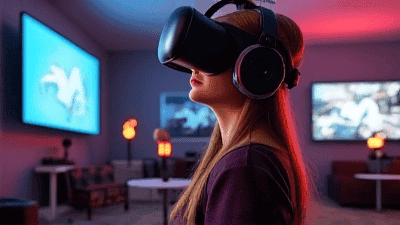
Is Your Gaming Addiction Real? How to Balance Passion and Life
In today's hyper-connected world, digital gaming has transcended its niche origins to become a global phenomenon, captivating billions. However, amidst this widespread engagement, a crucial question emerges: when does passionate play cross the line into problematic behavior? The concept of "gaming disorder," now recognized by major health organizations, highlights the complex interplay between enjoyment and potential psychological dependence, presenting a significant challenge to individuals, families, and public health.
The proliferation of online multiplayer games, immersive virtual realities, and competitive esports has dramatically altered the landscape of leisure and entertainment. For many, gaming is a source of joy, social connection, and skill development, offering cognitive benefits and avenues for creative expression. Yet, the intense reward systems, persistent online environments, and accessible nature of modern gaming can, for a vulnerable minority, lead to maladaptive patterns of use. This topic garners fervent discussion within the scientific community, industry, and society, balancing the substantial economic and cultural value of gaming against genuine concerns for well-being. What impact would it have on our understanding or practice of mental health and digital citizenship if we failed to fully comprehend the nuanced distinction between a healthy hobby and a genuine behavioral addiction?
Defining the Line: Understanding Gaming Disorder

From Hobby to Harm: The Clinical Perspective
Gaming disorder, recognized by the World Health Organization (WHO) in its ICD-11 (International Classification of Diseases, 11th Revision) and acknowledged for further research in the American Psychiatric Association's DSM-5 (Diagnostic and Statistical Manual of Mental Disorders, Fifth Edition), signifies a pattern of gaming behavior characterized by impaired control over gaming, increasing priority given to gaming over other life interests and daily activities, and continuation or escalation of gaming despite the occurrence of negative consequences. This is not merely about playing a lot; it's about a clinically significant impairment in personal, family, social, educational, occupational, or other important areas of functioning, typically evident for at least 12 months. The underlying mechanisms often involve the brain's reward pathways, particularly the dopamine system, where repetitive engagement in highly stimulating games can lead to neuroadaptations, similar to substance addictions. When a player finds themselves unable to stop despite wishing to, or neglecting essential duties for gaming, it's like a train accelerating downhill without brakes, propelled by internal urges and external stimuli. A common case might involve a university student whose grades plummet because late-night gaming sessions supersede study, leading to social isolation and significant emotional distress.
Beyond the Screen: Impacts and Implications
Navigating the Social, Psychological, and Physical Spheres
The impact of problematic gaming extends across multiple facets of an individual's life, creating a ripple effect that touches mental, physical, and social well-being. Psychologically, individuals may experience heightened anxiety, depression, irritability, and a sense of guilt, especially when their gaming habits conflict with real-world responsibilities or expectations. Physically, a sedentary lifestyle, poor sleep hygiene due to late-night sessions, eye strain, carpal tunnel syndrome, and neglected personal hygiene are common manifestations. Socially, real-world relationships often suffer as virtual interactions take precedence, leading to isolation from family and friends, and even job loss or academic failure.
However, it is crucial to recognize that gaming itself is not inherently detrimental. In moderation, it can offer substantial cognitive benefits, such as improved problem-solving skills, enhanced reaction times, and better spatial awareness. Many games also foster social connections, teamwork, and leadership skills within online communities, providing a valuable outlet for social interaction, particularly for those who may find traditional social settings challenging. The challenge lies in distinguishing between beneficial engagement and detrimental immersion.
To illustrate the stark contrast, consider the following data points on gaming habits:
| Aspect | Balanced Gaming | Problematic Gaming |
|---|---|---|
| Time Spent | Defined limits (e.g., 1-2 hrs/day) | Excessive (e.g., 6+ hrs/day), uncontrollable |
| Social Impact | Enhances connections, shared activity | Isolates, neglects real-world ties |
| Mental Health | Stress relief, cognitive boost | Increased anxiety, depression, irritability |
| Physical Health | Active breaks, good posture | Sedentary, poor sleep, eye strain |
| Productivity | Post-tasks reward, skill development | Neglects duties, academic decline, job loss |
This table clearly highlights how the same activity—gaming—can yield vastly different outcomes based on the individual's approach and level of control. A balanced approach allows for the enjoyment of gaming's benefits while maintaining equilibrium across life's other important domains, whereas problematic engagement systematically erodes these foundations. Understanding these multifaceted impacts is paramount for both prevention and intervention strategies.
Reclaiming Control: Strategies for Healthy Gaming

Practical Steps Towards Mindful Play and Life Balance
For individuals seeking to establish a healthier relationship with gaming, or for families concerned about a loved one, several practical strategies can foster mindful engagement and better life balance. The first crucial step is self-awareness: recognizing that a problem exists and committing to change. Setting clear, achievable limits on gaming time is fundamental. This can involve using timers, scheduling specific gaming periods, and utilizing parental control features or self-exclusion tools available on many platforms. Just as a dieter plans meals, a healthy gamer plans play. Engaging in alternative hobbies and activities, particularly those involving physical exercise or social interaction, can help redirect energy and cultivate new interests. This might include joining a sports club, learning an instrument, or volunteering.
Another effective strategy is to identify and address the underlying reasons for excessive gaming. Is it a coping mechanism for stress, anxiety, or loneliness? Addressing these core issues through therapy, mindfulness practices, or seeking social support can significantly reduce the pull of gaming. Cognitive Behavioral Therapy (CBT), for instance, can help individuals restructure problematic thought patterns and develop healthier coping mechanisms. Establishing a consistent sleep schedule, ensuring regular meals, and maintaining personal hygiene are basic but essential steps towards overall well-being. Open communication within families, setting boundaries together, and promoting a supportive environment are also vital. It’s about not cutting gaming out entirely, but integrating it into a balanced lifestyle, like adding spices to a meal rather than making it the whole dish.
Conclusion
The journey from passionate gaming to potentially problematic behavior is a complex landscape, one that demands a nuanced understanding rather than blanket condemnation. This article has explored the critical distinction of gaming disorder, examining its clinical definitions as recognized by global health authorities, and dissecting the profound impacts it can have on an individual's psychological, physical, and social well-being. We've seen that while gaming offers numerous benefits, from cognitive enhancement to community building, uncontrolled engagement can lead to significant life impairment. The core message is clear: the ability to maintain control, prioritize real-world responsibilities, and adjust gaming habits in response to negative consequences serves as the definitive boundary between a cherished hobby and a genuine behavioral addiction. Recognizing this line is the first, most crucial step towards fostering healthy engagement.
Looking ahead, the evolving digital landscape presents both opportunities and challenges in addressing gaming disorder. The growth of esports, coupled with advancements in virtual reality and augmented reality, promises even more immersive experiences, necessitating proactive public health strategies. Future research must focus on earlier identification of at-risk individuals, the development of personalized intervention programs, and the integration of mental health support directly within gaming platforms. Macro scientific policies will play a critical role in standardizing diagnostic criteria and increasing access to evidence-based treatments. Interdisciplinary collaboration between game developers, psychologists, educators, and policymakers is essential to create games that promote well-being and to educate society on responsible digital citizenship. Continuous research and open dialogue are paramount to ensure that the transformative power of gaming remains a force for good, enriching lives without compromising health or happiness.
Frequently Asked Questions (FAQ)

Q: What distinguishes passionate gaming from gaming disorder? A: The distinction between passionate gaming and gaming disorder lies primarily in the level of control an individual has over their gaming behavior and the extent to which gaming negatively impacts other areas of their life. Passionate gaming, like any hobby, involves a deep interest and enjoyment, often leading to significant time investment. However, a passionate gamer maintains control over their play, can stop when desired, and successfully balances gaming with other responsibilities such as work, school, social life, and self-care. They might dedicate many hours to gaming, especially during free time, but these choices are intentional and don't lead to significant distress or impairment. For example, a student might spend their weekends competitively gaming, but consistently completes assignments, attends classes, and maintains friendships.
In contrast, gaming disorder, as defined by the WHO, is characterized by a pattern of persistent or recurrent gaming behavior (digital-gaming or video-gaming) that involves three core criteria: impaired control over gaming (e.g., inability to limit duration, frequency, or context), increasing priority given to gaming to the extent that it takes precedence over other life interests and daily activities, and continuation or escalation of gaming despite the occurrence of negative consequences. This means the individual feels compelled to play even when they know it's harming their academics, relationships, health, or finances. They struggle to cut back, even if they want to, and experience significant distress or functional impairment. Imagine that same student now missing classes, failing exams, and isolating themselves from friends, all because they cannot stop playing. The gaming isn't just a hobby; it’s a compulsive behavior that undermines their life.
Q: How can I effectively manage my gaming time without feeling deprived? A: Managing gaming time effectively without feeling deprived involves a blend of self-awareness, strategic planning, and the cultivation of alternative interests. First, start by tracking your current gaming habits for a few days to understand your baseline. This objective data can be illuminating. Next, set clear, realistic, and specific limits. Instead of a vague "play less," aim for "I will game for 90 minutes after my work is done, then stop." Use timers or in-game parental control features to enforce these limits. Many consoles and PC platforms offer built-in time management tools.
To avoid feeling deprived, it’s crucial to replace the time spent gaming with fulfilling alternative activities. Think about what gaming provides you – challenge, social connection, relaxation – and find other ways to achieve those feelings. If gaming offers social connection, plan real-world meet-ups with friends or join a local club. If it’s about achievement, pick up a new skill like learning an instrument or a craft. If it’s relaxation, explore mindfulness, reading, or exercise. Scheduling these alternative activities into your day or week gives you something to look forward to. For example, after your 90 minutes of gaming, you might have a scheduled workout or a call with a friend. Additionally, practice "mindful gaming" – fully engaging in the game while you play, but being equally present when you stop. Recognize that you're choosing to take a break, not being forced, and that the break allows for other enriching experiences. It's like having a balanced diet; you enjoy treats in moderation, but you also consume wholesome foods for overall well-being.








